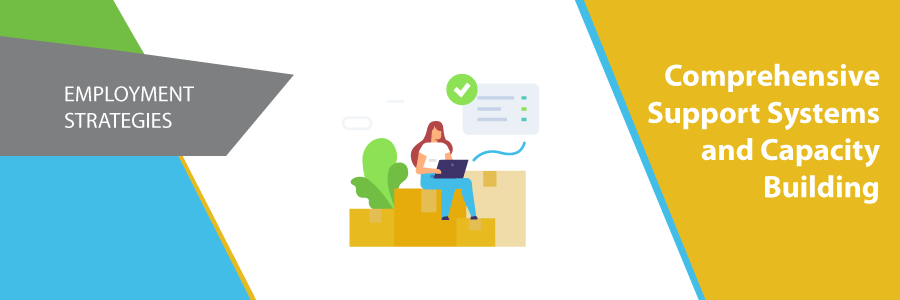Comprehensive Support Systems and Capacity Building
Comprehensive Support Systems and Capacity Building
Job seekers with multiple disabilities and complex resource needs are often ‘bounced’ from agency to agency and are unable to access all of the services and supports available to them. They may not have access to food, housing, transportation, and adequate health care services. These barriers interfere with their ability to participate in vocational rehabilitation and employment activities.
Comprehensive support systems capacity building empowers service providers and support systems to leverage and braid resources. This increases their ability to provide services that support people with disabilities to pursue and maintain quality employment.
How Does it Work?
Vocational rehabilitation agencies and community-based organizations can use these strategies to build capacity for comprehensive support systems:
Integrated Resource Teams
A customer with an established employment goal who is eligible for and requires services from two or more service systems can initiate an Integrated Resource Team. A Disability Resource Coordinator or other service provider may support the jobseeker in approaching and/or coordinating services to ensure that the employment plan receives necessary and available resources for the best chance for the jobseeker to achieve their employment goal.
Transportation Solutions
Challenges and solutions around access to transportation vary based on geographic location, available community resources and supports, and disability type. To use transportation as an employment strategy you must access the unique transportation resources in your community.
Evidence-Based Employment Practices
Certain evidence-based practices use a holistic, comprehensive approach to providing services to people with disabilities. This approach recognizes that complex life experiences and unmet needs often interfere with the ability to participate in vocational rehabilitation and employment activities. Two evidence-based practices useful in comprehensive support systems capacity building are:
- Individual Placement and Support (IPS)
IPS gives people with mental illness the help needed to work successfully at competitive jobs. The IPS model integrates the employment services team with the person’s mental health support team. Mental health information is part of the employment plan, and employment goals are part of the mental health treatment plans. - Trauma-Informed Care
A trauma-informed approach to providing service recognizes and accepts difficult behaviors as a person’s best effort to cope with and rise above an experience of trauma. It shifts focus from “What’s wrong with you?” to “What happened to you?” It fully integrates knowledge about trauma into policies, procedures, and practices.

Want to know more about how this employment strategy can be incorporated into your work? Check out these resources:

Featured Training
Watch webcasts to gain valuable information that will help improve employment outcomes and quality of employment for people you serve.
- Webcast: What is Possible When Systems Truly Collaborate?
- Webcast: Lessons Learned from Wisconsin Promise
- Webcast: Poverty and Disability – An Overview
- Webcast: Transportation Mini-Series, Webcast I: Non-Emergency Medical Transportation
- Webcast: Transportation Mini-Series, Webcast II: Rideshare
- E3 LGBTQ+ and Bias Training

Selected Tools and Resources
These tools and resources offer information to support your practice.
From the Virginia DARS Project E3:
- Community Academy Agenda
- Invite to Community Academy
- Registration to Community Academy
- Sample Invite List Community Academy
- Presentation Slides: Community Academy
More Resources:

Best Practices/Research
Project E3’s research summaries provide an “At-a-Glance” overview the latest research findings, as well as recommendations for best practices and how to incorporate them in your work.
- Substance Abuse Counselors Identify Barriers to Treatment
- The Elephant in the Room: Poverty, Disability, and Employment
- Early Intervention: Services for Young People and Families in Poverty
- Tips to Increase Transportation Access for People at Risk
- The Poverty Disability Model: 4 Groups of Risk Factors

Strategy Use in Targeted Communities
This Project E3 Community used this strategy to improve employment outcomes for their most underserved populations:

